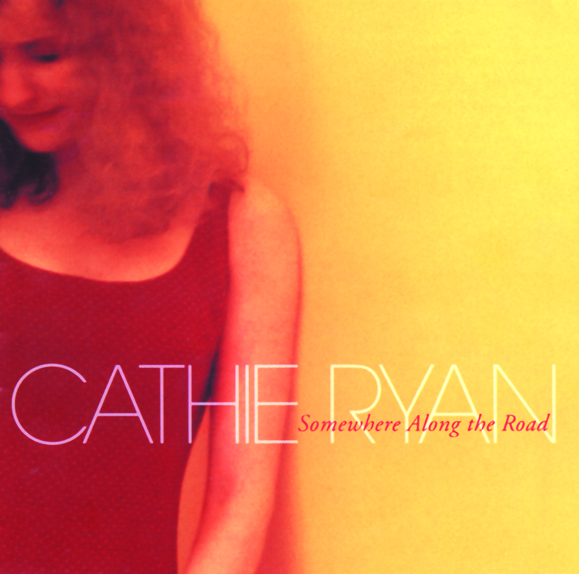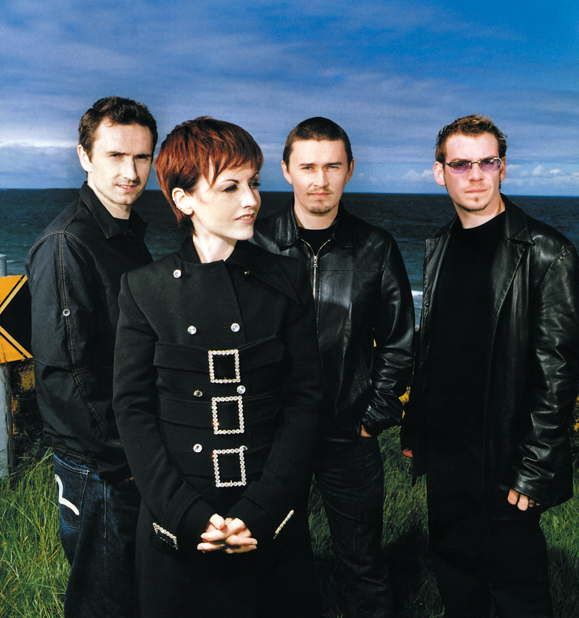The Cranberries performed to a small audience at the Bowery Ballroom in downtown Manhattan on August 22 to promote their new CD Wake Up and Smell the Coffee. Less than a month later New York would be the focus of the world’s attention with the horrible events of September 11. Drummer and founding member Fergal Lawler talks to Elizabeth Raggi about violence, new life and contentment.
Where were you when you learned of the tragedy in New York?
We were in Stockholm in an interview. This was before the second plane had crashed. It was so surreal. Watching it on the TV made it even worse, like it was a movie. You just kept thinking `this can’t be real.’ It was so frightening.
At your show in New York, Dolores O’ Riordan mentioned how good it felt to be back in NYC, saying “We love New York, New York, we do.” Can you offer any words to fans trying to cope?
I wouldn’t know where to begin. What do you say? Terrorism is such a horrible thing. We’ve been dealing with it [in Ireland] since I was a kid. But this is different. It’s not in one country; it’s a group of terrorists all over the world. But hopefully [President] Bush won’t just go in and start killing indiscriminately. That’s not the answer.
You decided to pull the video to your first single of the new album, “Analyse.” What did it show?
VH1 had just started airing it when it happened. It had a lot of modern structures; some of them looked like the Twin Towers, and a lot of airplanes. It was just coincidence really. We weren’t actually satisfied with it. It really didn’t relate to the song. We were considering another one, this just made it definite.
You mentioned the terrorism you were exposed to growing up. What is your opinion on the current state of the peace process in Northern Ireland?
Well, it’s at a stalemate now. We had that incident at Ardoyne Road where the Catholic children were trying to go to school. To see kids four or five years old being battered with stones; I had hope until then. It was horrific and it’s just because they are a different religion. It’s so childish, really. It’s like hating someone because I have brown shoes and you have blue shoes.
Also at the show, Dolores prefaced the song “Time Is Ticking” by mentioning the work that Bono’s wife, Ali Hewson, is doing with survivors of Chernobyl. Does the band intend to do any work with her?
Yeah, her work with the Chernobyl Children’s Project is great. We’re hoping to release the song as our second single, to get some publicity for it. We have to talk to the record company about it. We also would like to do some sort of benefit performance where the proceeds would go to the Project.
Your band mate Mike is quoted as saying “Fans everywhere can feel our vibe even if they don’t understand the lyrics.” Do you agree? Is it frustrating to you if you feel the words aren’t being understood?
We do lots of shows where our fans don’t speak English but they get the general gist even if they don’t know the words. Most of our songs are about emotions. You can get a feeling from a song, just from the music. It happens naturally when all four of us play together.
What was the inspiration for your new album? What did you most want to get across?
There is a feeling of contentment in the band. We’re all really enjoying ourselves. Life is really good, right now. There’s the new babies and my baby boy, and Mike’s expecting his first next week.
Yeah, both Dolores and Noel each had their second child this year. Dolores was actually pregnant while recording. Do you feel all the new life surrounding the band influenced the making of this album?
Yes, definitely. We were affected by all the excitement. And having children changes things. After children you relax a little bit. You don’t worry about the small, stupid things. You worry about if your wife and child are okay. That is what is important. But I’d say that over all there was a positive feeling in making the album. You know, some of our songs can tend to be negative, but I feel this album is overall very positive.
With the Cranberries celebrating ten years together, you can look back at the early days. What are your thoughts on the hard work and hard touring?
They were really great, the first few years. We were so young starting out, I was the oldest and I was 22! Our first tour, playing all the small clubs in the U.S. was fantastic. In ’93 we must have been in nearly every state, it was all a big adventure. But after the third album we were shattered. We were touring for six years straight with no breaks. Any time off, we spent recording. It was just too much. We were falling apart.
How will you keep yourselves from getting shattered on your European and upcoming U.S. tour this spring?
We did our Bury the Hatchet tour a year and a half ago and we were okay. It was well scheduled, like this one is. We perform for one or two nights and then get a rest. It’s great. You don’t get bored — because you know, that happens when you’re doing 16 or 17 shows in a row. And we have time to go see our families. It’s really not fair to the kids to be dragging the family around everywhere. It doesn’t work.
During those hectic days when the band did get a rare day off, you made it a point to hang out together. Are you still as close?
Definitely. We’ve been friends since we were fourteen, and playing together since we were eighteen. Then we met Dolores and she fit perfectly. We’ve never had a fight. I mean, there are times when we all annoy each other but nothing serious. It’s like brothers and sisters.
It’s way off, but are there already any plans for the Cranberries after the tour?
We’re trying to focus on this tour. But we don’t stop writing new stuff. We can’t. Even now, Dolores comes in doodling little bits. We never sit down and say “Now is when we tour, and now is when we write.” You write when you feel it. If it’s there it comes out. We usually write nineteen or twenty songs and then pick the best for the album.
What are your hopes for the Cranberries down the road?
The same as they’ve always been, I guess. Longevity. In this business it’s the hardest thing. I’d like to see us together for another five or ten years, as long as we are happy doing this.
What are your goals for yourself?
To make sure that my family is happy. I really want to be a devoted father and husband.
Wake Up and Smell The Coffee — MCA Records.
Traditional Music Roundup
When it seems like some of the best voices in recording today are making records that all sound the same, and say little, it’s a sheer breath of fresh air not only to hear Cathie Ryan but to listen to the lyrics she’s written or Chosen to adapt. “Music is blood memory” she sings on “In My Tribe.” It is a memory she has spent her life uncovering. Trained under the mastery of sean nos shaman Joseph Heaney, Cathie’s ability glows on Somewhere Along the Road, her second album since leaving the Irish music group Cherish the Ladies. She said this album was an attempt to “get back to basics.” It is basically beautiful. At times Ryan’s four-octave voice is light, others it is deep as a sigh. Some of the most moving moments are when she’s not singing. Her ability to “hold the pause” is superior. Joined by producer and musician John McCusker, piper Ian MacDonald, percussionist James McKintosh — whose beats on “Raking and Rouging” drip like the fine brandy of its refrain from a stingy barman until Ryan’s voice gushes it — and featuring a haunting appearance by Kate Rusby on the title track, this album is one to cherish. Shanachie Entertainment.

In Journey of the Celts, renowned Irish musician/composer Will Millar of The Irish Rovers and Grammy-award winner Paul Horn embark on an attempt to tell the musical tale of the Irish of the mid-19th century. Millar, who was raised around master storytellers, and Horn, one of the first composers to make site-specific recordings, are qualified for the job. The album opens with traditional tunes, and spreads to include banjo, cello and even Didgeridoo as the Celtic culture mingled with and infused their adopted lands. Among the most effective pieces are The Passing of the Gael and Distant Horizons. While the Irish story is one of unfathomable hardship and devastation, the 47-minute CD refrains from being too dreary. Even the historical information that accompanies the nine tracks — and there is a lot of information, the quotes and excerpts of the day are an interesting read on their own — remind us that “Through persecution…the music and dance and the poetry were always kept alive.” Chacra Music.
“Lake of Shadows is the name given locally to one of the most enchanted stretches of water in Ireland — Lough Swilly in County Donegal. It has witnessed some of the most significant events in Irish history and has been the scene of some of the happiest and some of the most tragic times in my own life,” writes pianist Phil Coulter. The musician, whose talent has taken him to Carnegie Hall and the White House, takes us to a place of intense difficulty for him. In Lake of Shadows he captures his childish wonder with this coast, and the pain it has caused his family as it took the lives of first his brother and a year later his sister. In ethereal songs he wrote for them both, he pours forth that pain. He captures too the historical pain of this land in “The Flight of the Earls,” with a chilling narration by Liam Neeson. Also lending their voices to tracks are Sinead O’Connor, Roma Downey, Aoife ni Fhearraigh and the Coolea Choir. Coulter has turned his personal heartache into an epic, and his path to healing is one we all can learn from. BMG. ♦


Leave a Reply